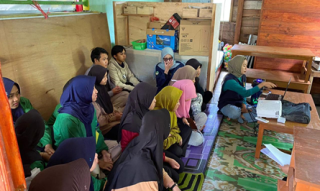Collaboration training: Composting organic waste with Karang Taruna and Kanreapia Youth Organization
Abstract
Globally, waste production continues to increase along with population growth and consumption. This has caused serious problems related to waste management in many areas. Including in Halahalaya Hamlet, Kanreapia Village where waste that is not managed properly can threaten human health, the environment and the sustainability of natural resources. To reduce the accumulation of waste, the community needs to be empowered and equipped with waste processing methods with the younger generation as their representatives. So that this is the goal to be achieved in this activity. The methods used in this program are counselling and demonstration. All training participants are members of two internal organizations, namely Karang Taruna and IPMAH Kanreapia Organization who live in Halahalaya Hamlet, Kanreapia Village, Tombolo Pao District, Gowa Regency, with a total of 9 people. Data analysis was carried out descriptively by looking at the average pre and post test scores. From the results of the analysis, it was concluded that there was an increase in knowledge before counselling was given and after counselling, where before counselling with an average value of 47.78 then after counselling became 62.22, this showed the success of counselling on the use of organic waste carried out.
References
Chireshe, A., Shabani, T., & Shabani, T. (2023). Safety and health risks associated with illegal municipal solid waste disposal in urban Zimbabwe.“A case of Masvingo City”. Safety in Extreme Environments, 5(3), 243-252.
Ferronato, N., & Torretta, V. (2019). Waste mismanagement in developing countries: A review of global issues. International journal of environmental research and public health, 16(6), 1060.
Ichsan, T. J., Gunawan, T., & Handayani, R. (2019). Prototipe Pemilah Sampah Organik Dan Non-organik. eProceedings of Applied Science, 5(3).
Kriswantoro, H. K., Safriyani, E., & Bahri, S. (2016). Pemberian pupuk organik dan pupuk NPK pada tanaman jagung manis (Zea mays saccharata Sturt). Klorofil: Jurnal Penelitian Ilmu-Ilmu Pertanian, 11(1), 1-6.
Kurniaty, Y., Nararaya, W. H. B., Turawan, R. N., & Nurmuhamad, F. (2016). Mengefektifkan pemisahan jenis sampah sebagai upaya pengelolaan sampah terpadu di Kota Magelang. Varia Justicia, 12(1), 135-150.
Mardwita, M., Yusmartini, E. S., Melani, A., Atikah, A., & Ariani, D. (2019). Pembuatan kompos dari sampah organik menjadi pupuk cair dan pupuk padat menggunakan komposter. Suluh Abdi, 1(2).
Nazirah, L. (2019). Pengaruh Pupuk Kompos Terhadap Pertumbuhan dan Hasil Beberapa Varietas Kedelai (Glycine max (L.) Merrill). Jurnal Penelitian Agrosamudra, 6(2), 8-15.
Noviana, L., & Sukwika, T. (2020). Pemanfaatan sampah organik sebagai pupuk kompos ramah lingkungan di kelurahan Bhaktijaya Depok. Jurnal Pengabdian UntukMu NegeRI, 4(2), 237-241.
Nurfajriah, N. N., Mariati, F. R. I., Waluyo, M. R., & Mahfud, H. (2021). Pelatihan Pembuatan Eco-Enzyme Sebagai Usaha Pengolahan Sampah Organik Pada Level Rumah Tangga. Jurnal Ikra-Ith Abdimas, 4(3), 194–197.
Nurhamidah, N., Amida, N., Rohiat, S., & Elvinawati, E. (2021). Pengolahan Sampah Organik Menjadi Eco-Enzyme pada Level Rumah Tangga menuju Konsep Eco-Community. Andromeda: Jurnal Pengabdian Masyarakat Rafflesia, 1(2), 43-46.
Rahmawati, R. (2018). Teknik Pengelolaan Limbah Rumah Tangga Berbasis Komunitas. Jurnal Teknologi Lingkungan UNMUL, 2(1).
Ramírez-Hernández, H., Perera-Rios, J., May-Euán, F., Uicab-Pool, G., Peniche-Lara, G., & Pérez-Herrera, N. (2018). Environmental risks and children’s health in a Mayan community from southeast of Mexico. Annals of Global Health, 84(2), 292.
Rosmala, A., Mirantika, D., & Rabbani, W. (2020). Takakura Sebagai Solusi Penanganan Sampah Organik Rumah Tangga. Abdimas Galuh, 2(2), 165.
Susilowati, L. E., Ma’Shum, M., & Arifin, Z. (2021). Pembelajaran tentang pemanfaatan sampah organik rumah tangga sebagai bahan baku eko-enzim. Jurnal Pengabdian Magister Pendidikan IPA, 4(4), 356-362.
Yudiyanto, Yudhistira, E., & Tania, A. L. (2019). Pengelolaan Sampah Pengabdian Pendampingan Kota Metro. Lembaga Penelitian Dan Pengabdian Pada Masyarakat, 6(11), 1–80.
Yuliana, A. I., Ami, M. S., & Hariono, T. (2021). Pendampingan Dan Penerapan Sistem Pertanian Urban Sebagai Model Pengelolaan Sampah Rumah Tangga Di Perumahan Bahrul Ulum Menara Asri Jombang. JMM-Jurnal Masyarakat Merdeka, 3(2).

Copyright (c) 2024 Munawir Amansyah, Alwiyah Nur Syarif, Berlian Berlian, Elva Elvira, Fitrah Ramadan

This work is licensed under a Creative Commons Attribution-NonCommercial-ShareAlike 4.0 International License.
